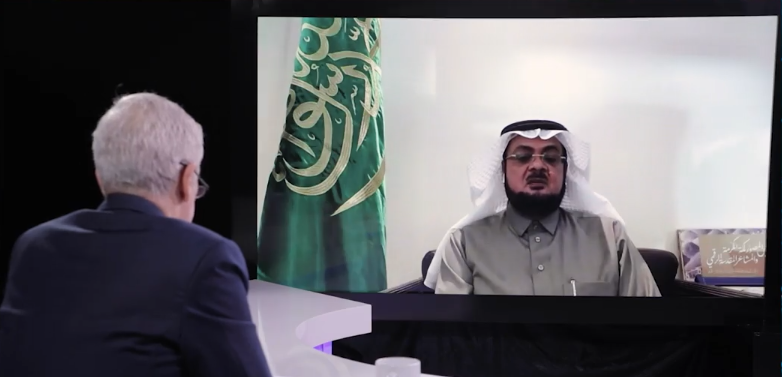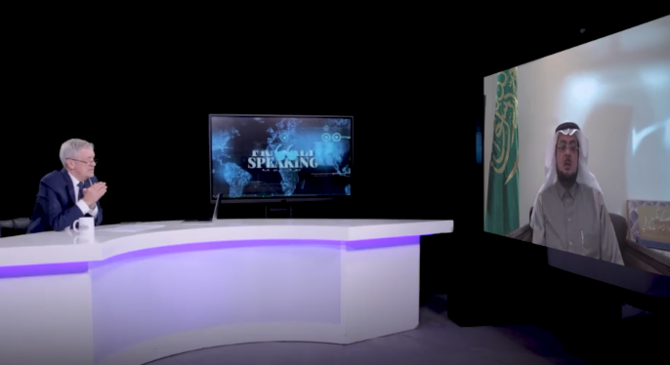DUBAI: Saudi Arabia can retain its role as the leading exporter of oil in the world while pursuing an ambitious strategy to mitigate the effects of climate change, one of the Kingdom’s leading environmental policymakers has told Arab News.
Dr. Osama Faqeeha, deputy minister for environment, water and agriculture, said that the issue for the Kingdom and the world was to deal with polluting emissions from hydrocarbon production, while exploring other uses for oil products and renewable alternatives.
“I think we don’t see the problem in the hydrocarbons; we see the problem in the emissions,” he said, pointing out that “petrochemicals, plastic, medical supplies, clothing and other things are made from hydrocarbons; the emissions are the issue — namely, CO2 emissions.”
Faqeeha, who is closely involved in implementing the measures of the Saudi Green Initiative unveiled last year, was appearing on Frankly Speaking, the series of video interviews with leading policymakers and business people.
He also spoke of the ambitious plan to plant 10 billion trees in the Kingdom, the campaign to protect its environmental eco-system and biodiversity, and efforts to improve the air quality in the capital Riyadh and other big cities.
Faqeeha said that the environmental campaign launched in the SGI was part of a comprehensive strategy to tackle the challenges of climate change and global warming.
“In this situation, Saudi Arabia has launched the Circular Carbon Economy approach, which is really to treat CO2 like any other waste, by basically taking it and recycling it in various ways.
“We have to realize that there is no single approach that can single-handedly address the global climate change challenge.
“We need renewable energy, we need the Circular Carbon Economy, we need recycling, we need to stop this deforestation, preserve habitats, reduce marine plastics. We have to focus on all of this,” he said.
The plan to plant 10 billion trees in Saudi Arabia over the coming decades, a striking feature of the SGI, is acknowledged as a challenge given the Kingdom’s desert climate and relatively low level of rainfall.
“Definitely this is a very challenging, ambitious target. As His Royal Highness the Crown Prince (Mohammed bin Salman) announced, the time frame will be over the next few decades. Our focus really is on environmental sustainability. We intend to achieve this target with due consideration for environmental sustainability.
“To achieve this, first of all we will focus on using native plant species in the Kingdom. Believe it or not, there are more than 2,000 documented species of flora in the Kingdom that have adapted to the dry and arid climate in Saudi Arabia.
“So, really these plants thrived in this environment and (fully) adapted to it,” he said.
The tree planting program — already under way — would focus on four main areas: Restoring natural flora in mountains and valleys; an “urban greening” program for the big cities; plantation in agricultural areas to support food production and rural communities; and tree planting along major highways to counter sand encroachment and enhance the experience of travelers.
Renewable water sources would also be used in the tree-planting program, to avoid endangering precious groundwater. Treated wastewater and rain harvesting were among the techniques available to environmental policymakers, as well as greater use of maritime resources.

Dr. Osama Faqeeha appears on Frankly Speaking. (Arab News)
“Saudi Arabia has thousands of kilometers of coastline on the Arabian Gulf and the Red Sea. There are two species of native mangrove trees that grow in sea water, so we intend to focus on those species as well,” he said.
One issue that has provoked debate in the Kingdom is the traditional practice of cutting natural wood to make campfires, held responsible for some of the desertification the SGI is pledged to eliminate.
“Local people enjoy picnics and the outdoors, they like to light wood fires for family gatherings, and these are local traditions that we really cherish. However, it came at a high expense of the local vegetation.”
The new environmental law has imposed severe penalties on such practices, but Faqeeha said that there were incentives for alternatives to wood fires so that these traditions would not be affected.
The World Health Organisation has criticized Saudi Arabia and other countries in the Middle East for low standards of air quality, but Faqeeha took issue with some of the WHO findings.
“I’d like to highlight a distinction between air pollution and degraded air quality. Sometimes you have a degraded air quality not because it’s polluted by human activities. The WHO uses particulate matters as the main parameters to measure air quality,” he said.
“That’s a very good parameter for (places such as) Europe and the US, where you have extensive vegetation cover, and the main source of particulate matters are power plants, factories and other human activities. We call such particulate matters anthropogenic particulate matter or PM.
“Here in Saudi Arabia and in the region as a whole, particulate matters are dominated by natural causes, mainly coming from dust storms. Definitely air quality becomes degraded during dust storms — no one claims that it is healthy to go outdoors and inhale dusty weather.
So, that’s really what they (WHO) are referring to. It is degraded air quality because of the natural particulate matters emanating from dust storms.”
The ministry was working on comprehensive measure to reduce dust storms and improve air quality, Faqeeha said.
At the COP26 climate change summit in Glasgow last year, some experts warned that Saudi Arabia and other Gulf countries would suffer more than other parts of the world from the health effects of global warming, including extreme heat, diseases and air pollution.
Faqeeha acknowledged this was an issue that policymakers were confronting. “Definitely, climate change and global warming is a major global challenge that we are taking very seriously.
“In terms of the outlook for temperature, there are very few studies. In the entire region we don’t have a climate center for climate studies and that’s why the Crown Prince announced the creation of the Regional Center for Climate Studies here, which will be championed by the National Center for Meteorology in Saudi Arabia. Its job is to do national and regional studies on the mid- and long-term outlook for climate change,” he said.
One big focus of Saudi environmental strategy, he added, is the push to reverse the trend to land degradation and desertification, a major contributor to the generation of polluting greenhouse gas emissions that costs around trillions of dollars globally.
“Land degradation is the second largest contributor of greenhouse gases. In fact, land degradation is the cause of about more than 50 percent of biodiversity loss, which is a large contribution. Also, it has a huge impact on agricultural lands and food security,” Faqeeha said.
Measures to reverse land degradation were a major achievement of the G20 summit under Saudi Arabia’s presidency in 2020.
Faqeeha also outlined the Kingdom’s new strategy toward waste management, which he views as an area ripe for private sector involvement and foreign investment.
“Private sector participation is an important enabler to achieve the objectives of the national environmental strategy,” he said.
“We have many international companies that are coming, who feel the regulatory environment now is highly conducive to their participation.”






























